人教版英语八年级上册Unit1复合不定代词精讲及考点解析
初中英语人教新目标八年级上册Unit 1 重点语法解析

八年级英语上册Unit 1重点语法解析1.在英语中,anything, something, nothing和everything是用于指代事物的复合不定代词,与之相对应的复合不定代词anyone, someone, no one和everyone (anybody, somebody, nobody和everybody) 用于指人。
与形容词连用时,形容词必须置于复合不定词之后,语法上称作“后置”。
e.g. I can see someone new in your group.我在你团队里看到一个新人。
There’s nothing interesting in the news today.今天没什么有趣的新闻。
2.anywhere adv. 在任何地方常用于一般疑问句或否定句中,代替somewhere。
e.g. I can’t find my keys anywhere.我到处找也找不到我的钥匙。
3.taste作连系动词,意为“尝起来”,其后常接形容词构成系表结构。
类似用法的词有:sound(听起来),smell(闻起来), look(看起来),feel(摸起来)e.g. The cake tastes decilious.蛋糕尝起来很美味。
4.few、a few、little、a little的区别和联系:◆few / a few用来修饰可数名词,few表示否定意义,没有,几乎没有;a few表示有肯定意思,有几个。
e.g.He has few friends here. He feels lonely.他这里没朋友。
他感觉寂寞。
There are a few eggs in the basket.篮子里有几个鸡蛋.◆little / a little用来修饰不可数名词,little表示否定意思,没有,几乎没有,a little 表示肯定意思,有一点儿。
e.g.There is little ink in my bottle. Can you give me a little ink?我的瓶子里没有墨水了, 你能给我点儿墨水吗?5.◆most意为“大多数”,后跟可数名词或不可数名词均可。
人教版英语八年级上册_Unit 1 复合不定代词和一般过去时

Don't waste food. We don't have much now.别浪费食物。我们现在没有很多(食物)了。
一般过去时的规则动词与不规则动词
1.一般过去时的定义
一般过去时表示过去某个时间发生的动作或存在的状态,也表示过去经常或反复发生的动作。
④中间去e,末尾加t。如:keep→kept;feel→felt;sleep→slept;sweep→swept等。
⑤过去式以ought或aught结尾的单词。如:think→thought; buy→bought; bring→brought; teach→taught;catch→caught等。
-I went to Beijing.我去北京了。
(3)两个或两个以上动词用and连接时,若前一个动词为过去式,后面的动词一般也要用其过去式。
I stayed at home and read a goodbook last Sunday.上个星期天我待家里读了一本好书。
4.规则动词过去式的构成和发音
③复合不定代词被形容词、动词不定式等修饰时,形容词、动词不定式等必须后置,结构为"复合不定代词+形容词/动词不定式”。
I'm hungry. Do you have anything to eat?我饿了。你有什么吃的东西吗?
I really havesomething to do.我确实有事情要做。
班级姓名学号分数
Unit1 Where didyougo on vacation?
复合不定代词和一般过去时
(时间:60分钟,满分:100分)
人教版八年级英语核心语法考点归纳

人教版八年级英语核心语法考点归纳八年级上册Unit 1考点一:复合不定代词复合不定代词由some, any, no, every 与one, body, thing 构成。
在使用复合不定代词时应注意以下几点:1. some- 一般用于肯定句中,any- 一般用于否定句或疑问句中,在表示请求、建议或期望得到肯定回答时,常用some- 构成的复合不定代词;2. 复合不定代词作主语时按单数看待;3. 形容词或else 修饰复合不定代词的时候应后置。
考点二:一般过去时定义:一般过去时表示过去某个时间发生的动作或存在的状态,也可表示过去经常发生的习惯性的动作或行为。
结构:主语+ 动词过去式+ 其他;主语+was / were + 其他。
常用时见壮语:yesterday, two years ago, last week, just now 等。
1.The old man _____ in Shanghai, but he _____ in Haikou now.A.be born; liveB.was born ; liveC.is born; livesD.was born; lives2. —Where were you last Saturday?—I ____ in the Capital Museum.A. amB. will beC. wasD. have been八年级上册Unit 2考点一:拼读副词频度副词表示动作或行为发生的频率。
常见的频度副词及其发生的频率如下表:考点二:how 疑问词组练一练3.()do you usually go to school,Simon? -by bike.A.WhenB.HowC.WhatD.Where(答案在文末获取)八年级上册Unit 3考点一:形容词和副词的比较级形容词和副词的比较能表示两者之间的比较关系,表示A 比B 更……,通常用than 来连接。
人教新目标英语八年级上册Unit1单元知识点讲义

人教新目标英语八年级上册Unit 1 单元知识点讲义1.复合不定代词:指人: someone anyone no one everyone某人某人,任何人没有人每人somebody anybody nobody everybody指物:something anything nothing everything某物某物,任何事物没有东西每件事物1) 复合不定代词做主语,谓语动词用单三.Ex. Someone is waiting for you at the door.Nobody knows the answer to the question .2) some…一般用于肯定句中,any…一般用于否定句和疑问句中.Ex. There is something in the room .There isn’t anything in the room .Is there anything in the room ?I have something to do today .I don’t have anything to do today .There is someone outside the door .There isn’t anyone outside the door.Is there anyone outside the door ?3) 在表示邀请,请求,建议希望得到对方肯定回答时,用some… , 不用any…Would you like something to drink / eat ?4) 肯定句中anything 表示任何事物, anyone = anybody 任何人Ex. Anything is OK.I can do anything for you .Anybody knows the answer.5) 形容词或to do 形式修饰复合不定代词时要后置.Ex. There is nothing wrong with my car.I have something important to tell you .There isn’t anything interesting here .Do you want something to drink / eat ?6) not everybody / everyone / everything 表示部分否定,意为‘并非都…’Ex. Not everyone likes singing .Not everything goes well .not any …和no…表示全部否定Ex. He listened ,but heard nothing .He listened ,but didn’t hear anything .not anything = nothing not anyone/ body = no one / nobodyEx. There is nothing in the bottle . = There isn’t anything in the bottle.7) no one 指人,回答Who 提问, no one of … / nobody 不能加ofnothing 指物, 不能加of none 指人或物,回答Is there …? 提问none of …Ex. Who is in the room ? No one .Is there anyone in the room ? None .2.表地点复合不定副词:somewhere anywhere某地,肯定句中某地,否定句和疑问句中/ 任何地方,肯定句中nowhere everywhere没有地方到处,每个地方, 用于肯定句中Ex. I want to go somewhere interesting .3.wonderful adj. 精彩的Ex. We had a wonderful time on the beach .It is such a wonderful film that we all enjoy it .who…wonder v. 想知道what…引导的宾语从句,用陈述句语序why…Ex. I wonder who the boy is . = I want to know who the boy is .I wonder what they are doing . =I want to know what they are doing .wonder +特殊疑问词+ to doEx. I wonder what to do . = I want to know what to do . = I wonder what I should do.I wonder where to go . / I wonder how to do that .4、几乎没有few 后接可数名词复数(否)little 后接不可数名词肯 a few 有一些,后加可数名词复数quite a few 相当多,不少a little 有点,后加不可数名词quite a little相当多,不少only a few 只有一点only a littlevery few 非常少very littleEx. I have a few friends. 肯I have few friends . 否I have quite a few friends .a little 修饰adj. = kind of= a little bit5. most of the time 大部分时间most of the foodmost of us/themmost of + n. = most +n.Ex. Most of the students like English . = Most students like English .6. Of course . = Sure. = Certainly . 当然.7. 反身代词第一人称:myself ourselves 我们自己第二人称:yourself 你自己yourselves 你们自己第三人称:himself 他自己herself 她自己itself 它自己themselves 他们自己8. seem 似乎,好像1) seem to be +形容词/名词= seem + 形容词/名词似乎…Ex. That seems to be her mother . = That seems her mother .It seems to be too difficult . = It seems too difficult.2) seem to do sthHe seems to have a cold.3) It seems that + 从句.It seems that he is happy. = He seems to be happy . = He seems happy.9. adj. bored 感到无聊的修饰人boring 令人厌烦的修饰事或物I feel bored , because the movie is boring.be bored with …对…感到无聊Ex. I’m bored with the boring movie.10. keep / write a diary = keep /write diaries 记日记(keep优先使用)11. activity n. 活动activities 复数Ex. What activities did you find interesting ?12. decide 决定1) decide to do sth. 决定做某事= make a decision to do sth = make one’s mind doing sthThey decide to visit the museum.decide not to do sth 决定不要做某事decide + 疑问词+动词不定式He can not decide when to leave.2) decide + 宾语从句(陈述句语序)He can’t decide when he leaves .I can’t decide where I should go. 改为同义句I can’t decide where to go.13. try to do sth. 努力尽力去做某事Ex. You must try to pass the exam.try doing sth. 试着做某事Ex. He tried making a model plane.try one’s best to do sth = do one’s best to do sth 尽最大努力做某事Ex. You should try your best to learn English well .have a try 试一试try on 试穿Ex. Let me have a try .14. feel like1)给……的感觉,后接从句He feels like he is swimming.I felt like I was a bird.2) feel like 想要后接名词/代词/doing sthfeel like doing sth = want to do sth =would like to do sth想要做某事Do you feel like taking a walk with me ?Do you want to take a walk with me ?3) feel + 形容词, 感到…I feel bored .look +adj. sound+adj. feel +adj.look like +n. sound like+n. feel like +n.15.look 看起来taste 尝起来be( was were is am are)sound 听起来feel 感觉摸起来系动词+adj.smell 闻起来seem 似乎16. build v. 建筑n. 体格of medium build 中等身材building n. 建筑物,大楼builder n. 建筑师16.difference n. 不同点-----differences n. 复数different adj. 不同的be different from …不同于… = not the same as…Ex. 1) Chinese names are different from English names. = Chinese names aren’t the same as English names .2) I’m different from you . = I’m not the same as you .3) I can’t see the differences between the buses in the picture.n. 不同之处17. on the top of the hill在山顶, 面at the top of the hill 在山顶, 点(最高点)at the foot of the hill在山脚下walk up to the hill top 径直走向山顶come top 登顶,得第一Ex. He always comes top every exam.18. wait for + 人或物wait 不及物动词,连接forEx. I’ll wait for you at the door.He waited over an hour for the train . ( He waited for the train over an hour. )can’t wait to do sth 迫不及待做某事Ex. The wonderful vacation , I can’t wait .19. because + 从句because of + n./ pron./ doingBecause the weather was bad, we couldn’t see anything below.Because of the bad weather, we could n’t see anything below.20. enough 1) adj足够的,修饰名词做定语We have enough time to do our homework.I have enough money .2) adv.足够地,充分地,用来修饰形容词或副词,一般置于被修饰词之后I know him well enough.我足够了解他。
人教版八年级上复合不定代词用法
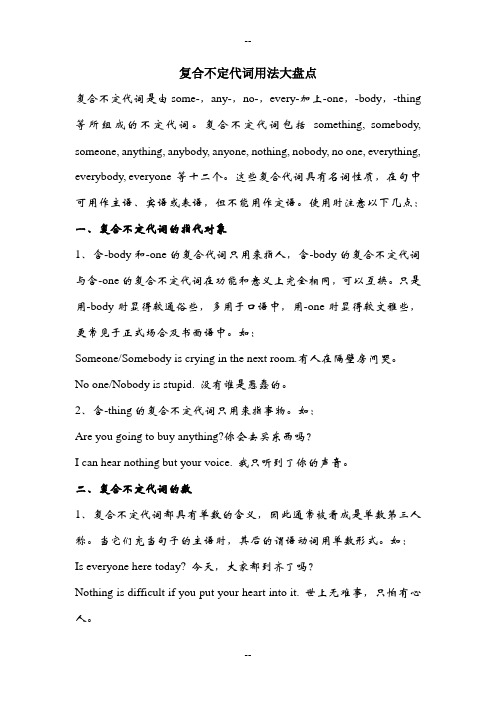
复合不定代词用法大盘点复合不定代词是由some-,any-,no-,every-加上-one,-body,-thing 等所组成的不定代词。
复合不定代词包括something, somebody, someone, anything, anybody, anyone, nothing, nobody, no one, everything, everybody, everyone 等十二个。
这些复合代词具有名词性质,在句中可用作主语、宾语或表语,但不能用作定语。
使用时注意以下几点:一、复合不定代词的指代对象1、含-body和-one的复合代词只用来指人,含-body的复合不定代词与含-one的复合不定代词在功能和意义上完全相同,可以互换。
只是用-body时显得较通俗些,多用于口语中,用-one时显得较文雅些,更常见于正式场合及书面语中。
如:Someone/Somebody is crying in the next room.有人在隔壁房间哭。
No one/Nobody is stupid. 没有谁是愚蠢的。
2、含-thing的复合不定代词只用来指事物。
如:Are you going to buy anything?你会去买东西吗?I can hear nothing but your voice. 我只听到了你的声音。
二、复合不定代词的数1、复合不定代词都具有单数的含义,因此通常被看成是单数第三人称。
当它们充当句子的主语时,其后的谓语动词用单数形式。
如:Is everyone here today? 今天,大家都到齐了吗?Nothing is difficult if you put your heart into it. 世上无难事,只怕有心人。
2、当要对一群人讲话时,可使用以复合不定代词作主语的祈使句,句中的动词用原形。
如:Nobody move!= Don’anybody move!都别动!Everyone lie down! 统统趴下!三、复合不定代词的定语复合不定代词的定语必须后置,即放在复合不定代词的后面。
人教版八年级上册Unit 1 语法复习 不定代词与一般过去时解析

• The apples on the table are bigger than ________ on the floor.
• The weather in Hubei is warmer than ________ in Shaanxi.
• The old man has lived here ________ his life. 老 人已经在这里住了一辈子了。
• She has spent ________ the money on the books.
• 表示“数量多少”的不定代词:(a) few, (a) little, many, much
“某一个”。 • 3. some有时可用于疑问句,表示征求(对方的)意见,
希望得到对方的肯定回答,多用于提建议的句型如 Would you like…,Why not…,What / How about… 等句型中。
• 4. any也可用于肯定句中,表示“任何一个”,其后接 可数名词的单数。any other用于肯定句中,表示“其 余的任何一个”,其后接可数名词的单数。例如:
• other后接可数名词复数,相当于others,意为 “其余的(并非全部)”。
• the other后接可数名词复数,相当于the others, 意为“其余的(全部)”。此外,the other还可用 于表示两者之中的另一个,即one… the other…。
• else意为“别的”,往往放在复合不定代词或疑 问词之后。
•
•
5.A-B-C型(现在式、过去式和过去分词都不相同)
• it“它”,指代上文提到过的同一个单数名词。 one“一个”,指代上文提到过的单数名词中的 同类名词,其复数形式为ones。
人教版英语八年级上册Unit1复合不定代词精讲及考点解析

初中英语学习资料madeofjingetiejiUnit1 复合不定代词精讲及考点分析沂水县实验中学孟祥敏复合不定代词的组成:复合不定代词是由 some, any, no, every 加 -body,-thing,-one 组成,列表以下:Somebody 某人Anybody 任何人Someone 某人Anyone 任何人Something 某物,某事Anything 任何事物Nobody 没有人Everybody 每人No one 没有人Everyone 每人Nothing 没有东西Everything 全部因为在使用中有比较特别的习习用法,是考试中比较常有的考点。
一:复合不定代词和部分否认部分否认是考试中的热点考点,常表达的构造有两种:1:not+所有一定词2:助动词+not+ 所有一定词。
其意都为“并不是都,不都”。
前者是一般形态,如:Not everyone likesEnglish. 因为是基本观点,学生比较简单理解。
但后者和一般否认句比较相像,简单惹起学生判断上的迷惑,是出题的焦点。
1. I agree with most of what you said, but I don’ t agree with ______.A. everything B: anything C. something D. nothing剖析:有同学看到I don ’t agree就判断能否认句,选B, anything .这就是对句子理解出现了偏差。
句意是:我赞同你所说的大多数,但不是所有。
是一句典型的部分否认形式。
not everything 的构造表示“并不是每件事”。
因此正确答案是 A. everything。
2. ----The exam was di fficult, wasn’ t it?---- No, but I don’ t think ______ could pass it.A. somebodyB. anybodyC. nobody D everybody分析:同上题一样,不能将I don’t think简单得看成否定句而选 B. anybody 。
人教版八年级上册英语第一单元语法知识点总结
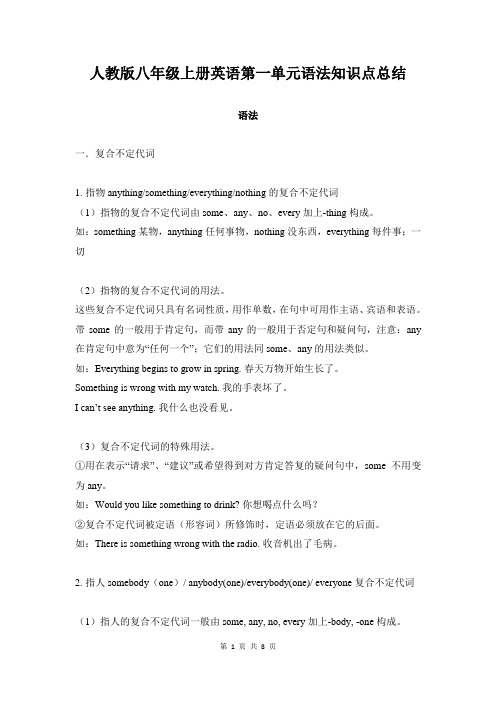
人教版八年级上册英语第一单元语法知识点总结语法一.复合不定代词1.指物anything/something/everything/nothing的复合不定代词(1)指物的复合不定代词由some、any、no、every加上-thing构成。
如:something某物,anything任何事物,nothing没东西,everything每件事;一切(2)指物的复合不定代词的用法。
这些复合不定代词只具有名词性质,用作单数,在句中可用作主语、宾语和表语。
带some的一般用于肯定句,而带any的一般用于否定句和疑问句,注意:any 在肯定句中意为“任何一个”;它们的用法同some、any的用法类似。
如:Everything begins to grow in spring. 春天万物开始生长了。
Something is wrong with my watch. 我的手表坏了。
I can’t see anything.我什么也没看见。
(3)复合不定代词的特殊用法。
①用在表示“请求”、“建议”或希望得到对方肯定答复的疑问句中,some不用变为any。
如:Would you like something to drink? 你想喝点什么吗?②复合不定代词被定语(形容词)所修饰时,定语必须放在它的后面。
如:There is something wrong with the radio. 收音机出了毛病。
2.指人somebody(one)/ anybody(one)/everybody(one)/ everyone复合不定代词(1)指人的复合不定代词一般由some, any, no, every加上-body, -one构成。
如:somebody某人,anybody任何人,nobody没人,everybody每人someone某人,anyone任何人, no one没人,everyone每人(2)指人的复合不定代词的用法。
英语人教版八年级上册常见复合不定代词的基本用法
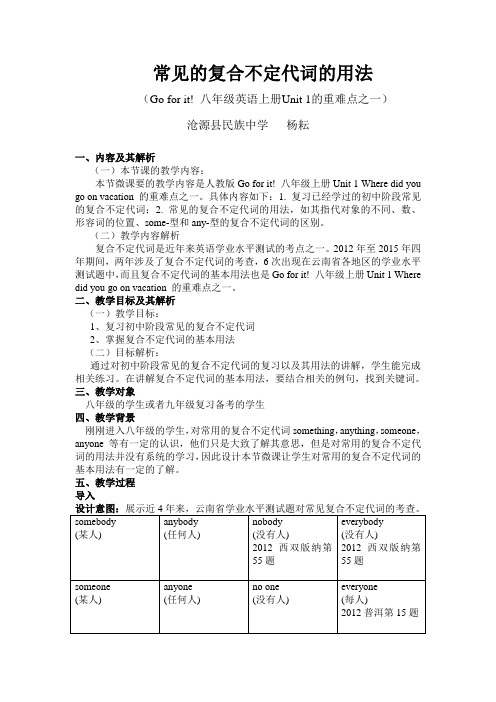
常见的复合不定代词的用法(Go for it! 八年级英语上册Unit 1的重难点之一)沧源县民族中学杨耘一、内容及其解析(一)本节课的教学内容:本节微课要的教学内容是人教版Go for it! 八年级上册Unit 1 Where did you go on vacation 的重难点之一。
具体内容如下:1. 复习已经学过的初中阶段常见的复合不定代词;2. 常见的复合不定代词的用法,如其指代对象的不同、数、形容词的位置、some-型和any-型的复合不定代词的区别。
(二)教学内容解析复合不定代词是近年来英语学业水平测试的考点之一。
2012年至2015年四年期间,两年涉及了复合不定代词的考查,6次出现在云南省各地区的学业水平测试题中,而且复合不定代词的基本用法也是Go for it! 八年级上册Unit 1 Where did you go on vacation 的重难点之一。
二、教学目标及其解析(一)教学目标:1、复习初中阶段常见的复合不定代词2、掌握复合不定代词的基本用法(二)目标解析:通过对初中阶段常见的复合不定代词的复习以及其用法的讲解,学生能完成相关练习。
在讲解复合不定代词的基本用法,要结合相关的例句,找到关键词。
三、教学对象八年级的学生或者九年级复习备考的学生四、教学背景刚刚进入八年级的学生,对常用的复合不定代词something,anything,someone,anyone等有一定的认识,他们只是大致了解其意思,但是对常用的复合不定代词的用法并没有系统的学习,因此设计本节微课让学生对常用的复合不定代词的基本用法有一定的了解。
五、教学过程导入问题一:复合不定代词的定义设计意图:让学生对常见的复合不定代词有个初步的认识1. 不定代词:是指没有指明代替任何特定名词的代词。
如:some, any, much, both, all等2. 复合不定代词:是有some-, any-, every-, no-加上-one, -body, -thing等所组成的不定代词。
人教版八年级上册英语第一单元知识点精讲

2.复合不定代词的用法
• (2)复合不定代词被形容词、动词不定式(例如:to do)等修饰时,形容词和动词不定式 等应置于其后。(复合不定代词在前,形容词和动词不定式在后)
• eg. Is there anything important in today’s newspaper?
• 今天的报纸上有什么重要内容吗?
thing something anything everything
nothing
比较some与any开头的复合不定代词的不同用法 (单选、完型)
• 1.any表示任意 常用在否定句或者疑问句中
• eg. Did anyone go to the beach with Amy?
• (有人曾跟Amy一起去了沙滩吗?)
只指人,不指物,且后面不接of短语 指人又指物,表示任何一个,后面可以接of短语
错误例句分析
在否定句中错误使用some, 如“I don't have some money.”
在疑问句中错误使用every,如 “Does everyone know the answer?”
区分小练习
1._____(someone/anyone) is putting up the tent. 有人在搭帐篷。 2.Anyone_____(like/likes) me. 每个人都喜欢我。 3.I don’t like ( ) of you. A. someone B.anyone C.any one 4.He didn’t find his glasses_____(anywhere/somewhere). 他到处都找不到他的眼镜。 5.Did you go _____(anywhere/somewhere) interesting on vacation?你去了哪些有趣的地方度 假了吗?
Unit 1 人教版英语八年级上册 期末语法总复习讲义

期末语法总复习Unit 1 讲义复合不定代词:一、带some 的不定代词,常用在中。
I bought for my parents,but nothing for myself.二、在表示和的疑问句中也用some- ,希望得到对方。
Would you like to eat ?Why didn’t you buy for yourself?三、带any 的不定代词,常用在和中。
I didn’t buy . = I bought .Did you go out with ?四、带any 的不定代词也可以放在肯定句中,表示。
I can do f or you.五、不定代词作主语,谓语动词用。
No one (be) here. Everyone (be) on vacation.Someone (want) to meet you.Everything (go) well.六、someone ,anyone ,everyone 指的是,且不和介词of 连用;some one ,any one ,every one 则既可指又可指,可与介词of 连用。
七、形容词修饰不定代词要:不定代词+形容词有意思的事情;特殊的人期末语法总复习Unit 1 练习1.—Allan is losing himself in books again.—Well, that's his favourite. He considers more important in his life than reading.A. everythingB.somethingC.anythingD.nothing2 .There isn't water in the cup.A .anyB .manyC .someD .the3 .The bottle is empty. There is in it.A .anythingB .somethingC .nothing4 .--“There isn't water here. Could you get for me?”--“All right.”A .some; someB .any; anyC .some; anyD .any; some5 .They were all very tired, but of them would stop to take a rest.A .anyB .someC .noneD .neither6 .Be quiet! I have to tell you.A .important anythingB .anything importantC .important somethingD .something important7. In China, red celebrations and people here this custom.A .is used for; are used toB .is used to; are used forC .is used to; are used toD .is used for; are used for8. Maria watch TV, but now she listening to music.A .used to;is used toB .is used to;used toC .used to;used toD .is used to;is used to9. Sue read newspapers after dinner but now she looking at Moments on We-chat.A .is used to, used toB .is used to, is used toC .used to, is used toD .used to, used to10. Those girls enjoyed in the party last night.A. themB. theyC. themselvesD. herself11. Help to some fish, children.A. yourselfB. yourC. yoursD. yourselves12. The film is very fun.A. it’sB. itselfC. itD. its13. –Who teaches math?–I teach .A. your, myselfB. you, myselfC. you, meD. you, herself14. The father will make a bike .A. her, himselfB. she, himselfC. her, herselfD. she, herself选词填空other, the other, others, the others, another1.What things can you see in the picture.2. I have two pens. One is red, is black.3. There are only five students in the classroom. What are ?4. There are a lot of people in the park. Some are walking, some are looking at the flowers, some are boating, are running.5. The jacket is too small for me. Would you show me one?。
初中英语人教版八年级上册不定代词知识点讲解
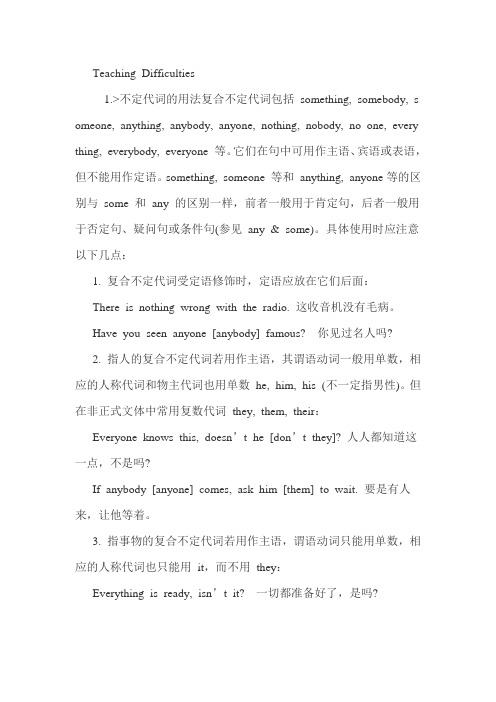
Teaching Difficulties1.>不定代词的用法复合不定代词包括something, somebody, s omeone, anything, anybody, anyone, nothing, nobody, no one, every thing, everybody, everyone 等。
它们在句中可用作主语、宾语或表语,但不能用作定语。
something, someone 等和anything, anyone等的区别与some 和any 的区别一样,前者一般用于肯定句,后者一般用于否定句、疑问句或条件句(参见any & some)。
具体使用时应注意以下几点:1. 复合不定代词受定语修饰时,定语应放在它们后面:There is nothing wrong with the radio. 这收音机没有毛病。
Have you seen anyone [anybody] famous? 你见过名人吗?2. 指人的复合不定代词若用作主语,其谓语动词一般用单数,相应的人称代词和物主代词也用单数he, him, his (不一定指男性)。
但在非正式文体中常用复数代词they, them, their:Everyone knows this, doesn’t he [don’t they]? 人人都知道这一点,不是吗?If anybody [anyone] comes, ask him [them] to wait. 要是有人来,让他等着。
3. 指事物的复合不定代词若用作主语,谓语动词只能用单数,相应的人称代词也只能用it,而不用they:Everything is ready, isn’t it? 一切都准备好了,是吗?4. anyone, everyone 等只能指人,不能指物,且其后一般不接of 短语。
若是指物或后接of 短语,可用any one, every one (分开写):any one of the boys (books) 孩子们(书)当中的任何一个(本)every one of the students (schools) 每一个学生(一所学校)2>seem 的用法。
人教版八年级上册英语Unit 1-10 语法归纳总结
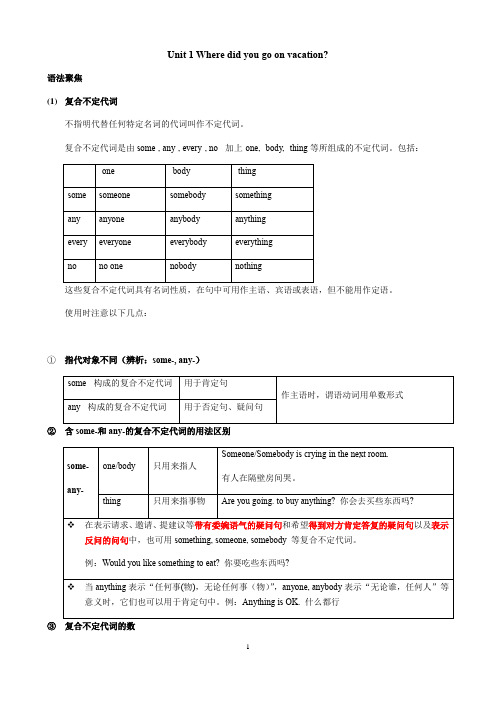
Unit 1 Where did you go on vacation?语法聚焦(1)复合不定代词不指明代替任何特定名词的代词叫作不定代词。
复合不定代词是由some-, any-, every-, no-加上-one, -body, -thing等所组成的不定代词。
包括:这些复合不定代词具有名词性质,在句中可用作主语、宾语或表语,但不能用作定语。
使用时注意以下几点:①指代对象不同(辨析:some-, any-)②含some-和any-的复合不定代词的用法区别③复合不定代词的数❖复合不定代词都具有单数的含义,当它们充当句子的主语时,其后的谓语动词用单数形式。
例:Is everyone here today? 今天每个人都到了吗?Nothing is difficult if you put your heart into it. 世上无难事,只怕有心人。
④复合不定代词的定语需后置,即放在复合不定代词的后面。
例:Can you tell something interesting? 你能讲些有趣的事情吗?(2)一般过去时(I)①一般过去时的用法一般过去时用来描述过去发生的动作或存在的状态。
常和一般过去时搭配的标志性的时间状语有yesterday, last week, in the past等。
例:They stayed at home yesterday. 昨天他们待在家里。
②一般过去时的三种句式结构:③一般过去时的句式变化❖be动词的一般过去时的句式变化❖there be句型的一般过去时的句式变化:❖行为动词的一般过去时的句式变化④动词的过去式的变化规律包括规则变化和不规则变化两种。
❖规则变化通常以-ed结尾。
具体如下:❖不规则变化的动词有许多,常见的有:(3)一般过去时(II)侧重行为动词的一般过去时的特殊疑问句①对人物进行提问时有两种情况:②对事件、时间、地点、方式等进行提问时,结构为:特殊疑问词+did+主语+动词原形+其他?❖What did he do last night? 昨天晚上他做什么了? (事件)❖When did you meet Lisa? 你是什么时候遇到莉萨的?(时间)❖Where did you go last weekend?上周末你们去哪里了?(地点)❖How did you get to Beijing? 你是怎么到北京的? (方式)❖Why did you want to visit China? 你为什么想去游览中国?(原因)Unit 2 How often do you exercise?语法聚焦❖频度副词:表示动作频率的副词辨析:always, usually, often, sometimes, seldom, neverUnit 3 I’m more outdoing than my sister.语法聚焦:形容词和副词比较级的基本用法大多数形容词(性质形容词)和副词有比较级的变化,用来表示事物的等级差别。
人教版八年级第一单元复合不定代词的用法

我们做些习题吧
一、从方框中选择适当的不定代词填空。 anything, someone, everyone, anyone, everything, something, nothing
1.I don't know _a_n_y_o_n_e_ at this school because I am new.
Someone puts an umbrella here.
Did you do anything interesting ? 2. some型不定代词有时用于疑问句中表示委
婉地请求 Would you like something to drink ? 特殊 any型不定代词用于肯定句中表示“任何”
三单形式
Someone is singing in the next room. Everyone is here. 6. 形容词修饰不定代词/副词时需将形容词后置。 I have something interesting to tell you. Is there anything important in today's newspaper ?
人教版八年级第一单元复合不 定代词的用法
不定代词
一、分类:
some 型
something 某事、某物 Someone某人 somebody
any 型
anything 任何事
anyone 任何人 anybody
no 型
nothing 没有什么
no one 没有人 nobody
every 型
everything 每件事物, everyone 每人,
Anyone can do it.
3. nothing, no one 均表示否定意义。 There's nothing interseting in today's newspaper. No one can do it better.
人教部编版八年级上学期英语第一单元unit1-2复合不定代词及动词辨析笔记(教材重难点讲解)

U1-U2单元重难点考点拓展:【1】Wait 动词等待Wait for sb/sth.等待某人或某事I am waiting for the teacher to solve my problems on math.Be doing 表示正在做某事Wait to do sth.等待去做某事I wait to order some fruit in this restaurant.Can’t wait to do sth.迫不及待做某事I can’t wait to talk with this wise智慧的man.我等不及想要和这个智慧的人交流了。
【2】Will 情态动词+ do sth.特别地:be willing to do sth. 愿意去做某事例子:We are willing to attend the party tonight.我们愿意去参加今晚的派对!【be willing to do sth.】愿意去做某事【be waiting to do sth.】正等待去做某事【can’t wait to do sth.】迫不及待去做某事【can’t help to do sth.】情不自禁做某事例子:We can’t help to laugh.我们情不自禁地笑了。
练习:-I can’t wait! 我等不及啦!-What happens to you?你怎么啦?-I see a new route from Canada to China,and it’s my dream city.I can’t wait to go there with my parents.When I think of this trip, I can’t help to laugh.我迫不及待要和我的父母去那里了!当我想到这趟旅行时,我情不自禁地笑了。
A can’t wait ; can’t helpB can’t help;can’t waitC can’t wait;can’t waitD can’t help;can’t help.【3】Too muchMuch tooToo many练习:用much too;too many;too much 填空There are too many books[可数名词复数形式] on the table.There is too much water【不可数名词】over the kitchenThe book is much too fantastic.[形容词]We all want to make too many friends【可数名词复数形式】in the school. Ming plays Kung Fu so well that some people overseas want to see【动词】much too【副词too修饰see;much修饰too。
人教版英语八年级上册Unit1复合不定代词精讲及考点解析

初中英语学习材料madeofjingetiejiUnit1复合不定代词精讲及考点解析沂水县实验中学孟祥敏复合不定代词的构成:复合不定代词是由some, any, no, every加-body,-thing,-one构成,列表如下:Somebody 某人Someone 某人Something 某物,某事Anybody 任何人Anyone 任何人Anything 任何事物Nobody 没有人No one 没有人Nothing 没有东西Everybody 每人Everyone 每人Everything 一切由于在使用中有比较特殊的习惯用法,是考试中比较常见的考点。
一:复合不定代词和部分否定部分否定是考试中的热门考点,常表达的结构有两种:1:not+全部肯定词2:助动词+not+全部肯定词。
其意都为“并非都,不都”。
前者是一般形态,如:Not everyone likes English. 由于是基本概念,学生比较容易理解。
但后者和一般否定句比较相似,容易引起学生判断上的疑惑,是出题的焦点。
1.I agree with most of what you said, but I don’t agree with ______.A. everything B: anything C. something D. nothing分析:有同学看到I don’t agree就判断是否定句,选B, anything .这就是对句子理解出现了偏差。
句意是:我同意你所说的大部分,但不是全部。
是一句典型的部分否定形式。
not…everything 的结构表明“并非每件事”。
所以正确答案是A. everything 。
2.----The exam was di fficult, wasn’t it?----No, but I don’t think ______ could pass it.A. somebodyB. anybodyC. nobody D everybody分析:同上题一样,不能将I don’t think 简单得看成否定句而选 B. anybody。
人教版(Go For It)八上语法:Unit 1 复合不定代词
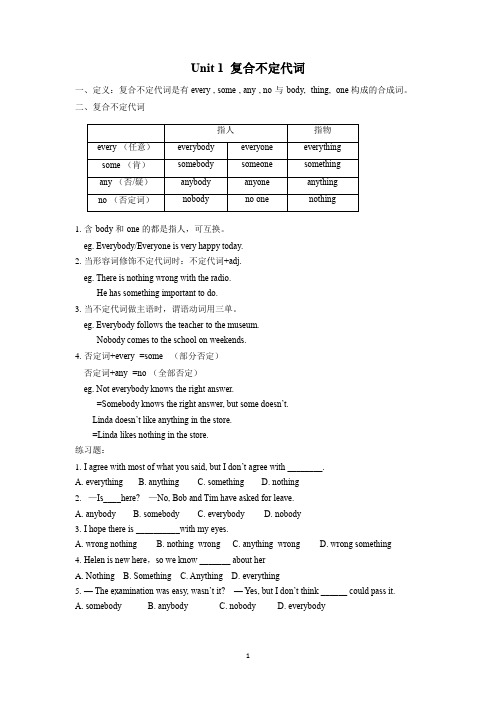
Unit 1 复合不定代词一、定义:复合不定代词是有every-, some-, any-, no-与-body, -thing, -one构成的合成词。
二、复合不定代词1.含-body和-one的都是指人,可互换。
eg. Everybody/Everyone is very happy today.2.当形容词修饰不定代词时:不定代词+adj.eg. There is nothing wrong with the radio.He has something important to do.3.当不定代词做主语时,谓语动词用三单。
eg. Everybody follows the teacher to the museum.Nobody comes to the school on weekends.4.否定词+every- =some-(部分否定)否定词+any- =no-(全部否定)eg. Not everybody knows the right answer.=Somebody knows the right answer, but some doesn’t.Linda doesn’t like anything in the store.=Linda likes nothing in the store.练习题:1.I agree with most of what you said, but I don’t agree with ________.A. everythingB. anythingC. somethingD. nothing2.—Is____here? —No, Bob and Tim have asked for leave.A. anybodyB. somebodyC. everybodyD. nobody3.I hope there is__________with my eyes.A. wrong nothingB. nothing wrongC. anything wrongD. wrong something4.Helen is new here,so we know _______ about herA.NothingB. SomethingC. AnythingD. everything5.— The examination was easy, wasn’t it? — Yes, but I don’t think ______ could pass it.A. somebodyB. anybodyC. nobodyD. everybody1。
- 1、下载文档前请自行甄别文档内容的完整性,平台不提供额外的编辑、内容补充、找答案等附加服务。
- 2、"仅部分预览"的文档,不可在线预览部分如存在完整性等问题,可反馈申请退款(可完整预览的文档不适用该条件!)。
- 3、如文档侵犯您的权益,请联系客服反馈,我们会尽快为您处理(人工客服工作时间:9:00-18:30)。
Unit1复合不定代词精讲及考点解析
沂水县实验中学孟祥敏
复合不定代词的构成:
复合不定代词是由some, any, no, every加-body,-thing,-one构成,列表如下:
由于在使用中有比较特殊的习惯用法,是考试中比较常见的考点。
一:复合不定代词和部分否定
部分否定是考试中的热门考点,常表达的结构有两种:1:not+全部肯定词2:助动词+not+全部肯定词。
其意都为“并非都,不都”。
前者是一般形态,如:Not everyone likes English. 由于是基本概念,学生比较容易理解。
但后者和一般否定句比较相似,容易引起学生判断上的疑惑,是出题的焦点。
1.I agree with most of what you said, but I don’t agree with ______.
A. everything B: anything C. something D. nothing
分析:有同学看到I don’t agree就判断是否定句,选B, anything .这就是对句子理解出现了偏差。
句意是:我同意你所说的大部分,但不是全部。
是一句典型的部分否定形式。
not…everything 的结构表明“并非每件事”。
所以正确答案是A. everything 。
2.----The exam was difficult, wasn’t it?
----No, but I don’t think ______ could pass it.
A. somebody
B. anybody
C. nobody D everybody
分析:同上题一样,不能将I don’t think 简单得看成否定句而选 B. anybody。
“not…everybody”构成部分否定,既“并非所有的人都能通过”。
所以应该选D. everybody。
二:复合不定代词的定语位置
复合不定代词被定语修饰的时候,定语必须放在不定代词后面。
特别是当修饰的定语比较复杂的情况下要认真分析,弄清词序间的修饰关系。
1.There is _____________ with your car.
A. nothing seriously wrong
B. seriously wrong nothing
C. nothing wrong seriously
D. wrong seriously nothing
分析:首先,seriously副词修饰wrong 形容词,seriously wrong表示“严重损坏”,seriously wrong 修饰nothing, 放在nothing 后面,意思是“严重损坏的地方”,nothing seriously wrong , 所以答案是A。
2.He asked me if there was _____________ to read.
A. easy enough something
B. enough easy something
C. something easy enough
D. something enough easy
分析:副词enough 修饰形容词easy, 放easy后面,easy enough意思是“足够简单的”。
easy enough 修饰不定代词something ,放something 后面。
something easy enough意思是“足够简。
